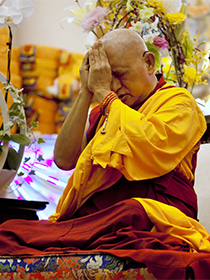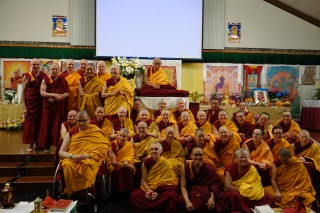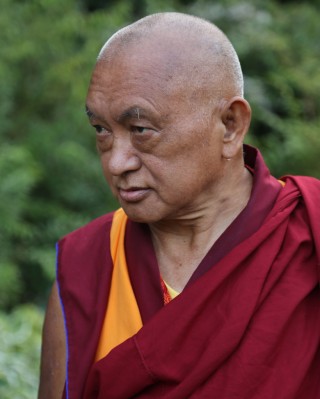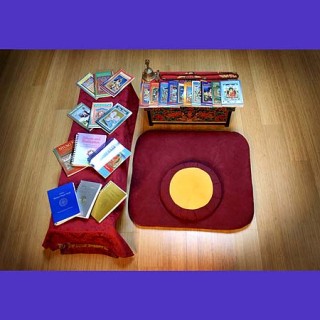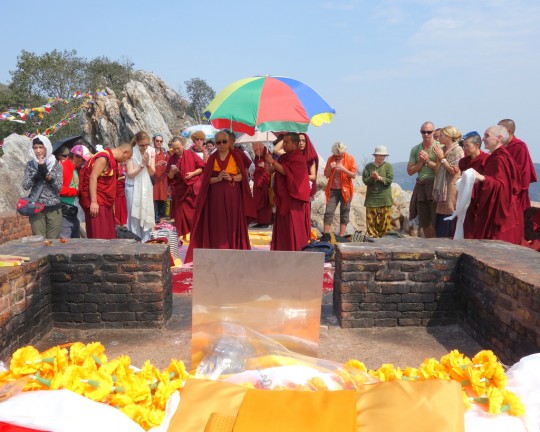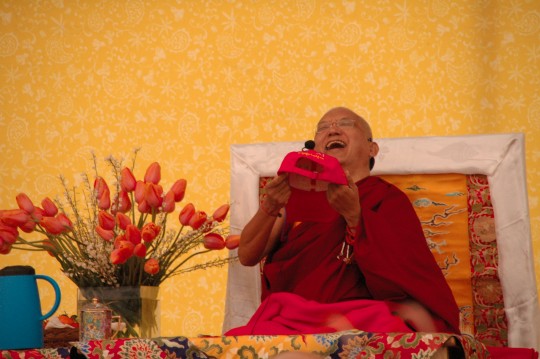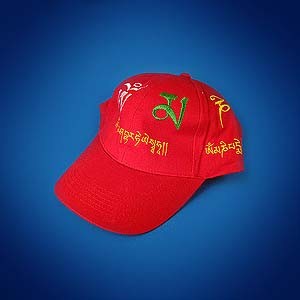- Home
- FPMT Homepage
Foundation for the Preservation of the Mahayana Tradition
The FPMT is an organization devoted to preserving and spreading Mahayana Buddhism worldwide by creating opportunities to listen, reflect, meditate, practice and actualize the unmistaken teachings of the Buddha and based on that experience spreading the Dharma to sentient beings. We provide integrated education through which people’s minds and hearts can be transformed into their highest potential for the benefit of others, inspired by an attitude of universal responsibility and service. We are committed to creating harmonious environments and helping all beings develop their full potential of infinite wisdom and compassion. Our organization is based on the Buddhist tradition of Lama Tsongkhapa of Tibet as taught to us by our founders Lama Thubten Yeshe and Lama Thubten Zopa Rinpoche.
- Willkommen
Die Stiftung zur Erhaltung der Mahayana Tradition (FPMT) ist eine Organisation, die sich weltweit für die Erhaltung und Verbreitung des Mahayana-Buddhismus einsetzt, indem sie Möglichkeiten schafft, den makellosen Lehren des Buddha zuzuhören, über sie zur reflektieren und zu meditieren und auf der Grundlage dieser Erfahrung das Dharma unter den Lebewesen zu verbreiten.
Wir bieten integrierte Schulungswege an, durch denen der Geist und das Herz der Menschen in ihr höchstes Potential verwandelt werden zum Wohl der anderen – inspiriert durch eine Haltung der universellen Verantwortung und dem Wunsch zu dienen. Wir haben uns verpflichtet, harmonische Umgebungen zu schaffen und allen Wesen zu helfen, ihr volles Potenzial unendlicher Weisheit und grenzenlosen Mitgefühls zu verwirklichen.
Unsere Organisation basiert auf der buddhistischen Tradition von Lama Tsongkhapa von Tibet, so wie sie uns von unseren Gründern Lama Thubten Yeshe und Lama Thubten Zopa Rinpoche gelehrt wird.
- Bienvenidos
La Fundación para la preservación de la tradición Mahayana (FPMT) es una organización que se dedica a preservar y difundir el budismo Mahayana en todo el mundo, creando oportunidades para escuchar, reflexionar, meditar, practicar y actualizar las enseñanzas inconfundibles de Buda y en base a esa experiencia difundir el Dharma a los seres.
Proporcionamos una educación integrada a través de la cual las mentes y los corazones de las personas se pueden transformar en su mayor potencial para el beneficio de los demás, inspirados por una actitud de responsabilidad y servicio universales. Estamos comprometidos a crear ambientes armoniosos y ayudar a todos los seres a desarrollar todo su potencial de infinita sabiduría y compasión.
Nuestra organización se basa en la tradición budista de Lama Tsongkhapa del Tíbet como nos lo enseñaron nuestros fundadores Lama Thubten Yeshe y Lama Zopa Rinpoche.
A continuación puede ver una lista de los centros y sus páginas web en su lengua preferida.
- Bienvenue
L’organisation de la FPMT a pour vocation la préservation et la diffusion du bouddhisme du mahayana dans le monde entier. Elle offre l’opportunité d’écouter, de réfléchir, de méditer, de pratiquer et de réaliser les enseignements excellents du Bouddha, pour ensuite transmettre le Dharma à tous les êtres. Nous proposons une formation intégrée grâce à laquelle le cœur et l’esprit de chacun peuvent accomplir leur potentiel le plus élevé pour le bien d’autrui, inspirés par le sens du service et une responsabilité universelle. Nous nous engageons à créer un environnement harmonieux et à aider tous les êtres à épanouir leur potentiel illimité de compassion et de sagesse. Notre organisation s’appuie sur la tradition guéloukpa de Lama Tsongkhapa du Tibet, telle qu’elle a été enseignée par nos fondateurs Lama Thoubtèn Yéshé et Lama Zopa Rinpoché.
Visitez le site de notre Editions Mahayana pour les traductions, conseils et nouvelles du Bureau international en français.
Voici une liste de centres et de leurs sites dans votre langue préférée
- Benvenuto
L’FPMT è un organizzazione il cui scopo è preservare e diffondere il Buddhismo Mahayana nel mondo, creando occasioni di ascolto, riflessione, meditazione e pratica dei perfetti insegnamenti del Buddha, al fine di attualizzare e diffondere il Dharma fra tutti gli esseri senzienti.
Offriamo un’educazione integrata, che può trasformare la mente e i cuori delle persone nel loro massimo potenziale, per il beneficio di tutti gli esseri, ispirati da un’attitudine di responsabilità universale e di servizio.
Il nostro obiettivo è quello di creare contesti armoniosi e aiutare tutti gli esseri a sviluppare in modo completo le proprie potenzialità di infinita saggezza e compassione.
La nostra organizzazione si basa sulla tradizione buddhista di Lama Tsongkhapa del Tibet, così come ci è stata insegnata dai nostri fondatori Lama Thubten Yeshe e Lama Zopa Rinpoche.
Di seguito potete trovare un elenco dei centri e dei loro siti nella lingua da voi prescelta.
- 欢迎 / 歡迎
简体中文
“护持大乘法脉基金会”( 英文简称:FPMT。全名:Foundation for the Preservation of the Mahayana Tradition) 是一个致力于护持和弘扬大乘佛法的国际佛教组织。我们提供听闻,思维,禅修,修行和实证佛陀无误教法的机会,以便让一切众生都能够享受佛法的指引和滋润。
我们全力创造和谐融洽的环境, 为人们提供解行并重的完整佛法教育,以便启发内在的环宇悲心及责任心,并开发内心所蕴藏的巨大潜能 — 无限的智慧与悲心 — 以便利益和服务一切有情。
FPMT的创办人是图腾耶喜喇嘛和喇嘛梭巴仁波切。我们所修习的是由两位上师所教导的,西藏喀巴大师的佛法传承。
繁體中文
護持大乘法脈基金會”( 英文簡稱:FPMT。全名:Found
ation for the Preservation of the Mahayana Tradition ) 是一個致力於護持和弘揚大乘佛法的國際佛教組織。我們提供聽聞, 思維,禪修,修行和實證佛陀無誤教法的機會,以便讓一切眾生都能 夠享受佛法的指引和滋潤。 我們全力創造和諧融洽的環境,
為人們提供解行並重的完整佛法教育,以便啟發內在的環宇悲心及責 任心,並開發內心所蘊藏的巨大潛能 — 無限的智慧與悲心 – – 以便利益和服務一切有情。 FPMT的創辦人是圖騰耶喜喇嘛和喇嘛梭巴仁波切。
我們所修習的是由兩位上師所教導的,西藏喀巴大師的佛法傳承。 察看道场信息:
- FPMT Homepage
- News/Media
-
- Study & Practice
-
-
- About FPMT Education Services
- Latest News
- Programs
- New to Buddhism?
- Buddhist Mind Science: Activating Your Potential
- Heart Advice for Death and Dying
- Discovering Buddhism
- Living in the Path
- Exploring Buddhism
- FPMT Basic Program
- FPMT Masters Program
- FPMT In-Depth Meditation Training
- Maitripa College
- Lotsawa Rinchen Zangpo Translator Program
- Universal Education for Compassion & Wisdom
- Online Learning Center
-
- Prayers & Practice Materials
- Overview of Prayers & Practices
- Full Catalogue of Prayers & Practice Materials
- Explore Popular Topics
- Benefiting Animals
- Chenrezig Resources
- Death & Dying Resources
- Lama Chopa (Guru Puja)
- Lama Zopa Rinpoche: Compendium of Precious Instructions
- Lama Zopa Rinpoche: Life Practice Advice
- Lama Zopa Rinpoche Practice Series
- Lamrim Resources
- Mantras
- Prayer Book Updates
- Purification Practices
- Sutras
- Thought Transformation (Lojong)
- Audio Materials
- Dharma Dates - Tibetan Calendar
- Translation Services
- Publishing Services
- Ways to Offer Support
- Prayers & Practice Materials
-
- Teachings and Advice
- Find Teachings and Advice
- Lama Zopa Rinpoche Advice Page
- Lama Zopa Rinpoche: Compendium of Precious Instructions
- Lama Zopa Rinpoche Video Teachings
- ༧སྐྱབས་རྗེ་བཟོད་པ་རིན་པོ་ཆེ་མཆོག་ནས་སྩལ་བའི་བཀའ་སློབ་བརྙན་འཕྲིན།
- Podcasts
- Lama Yeshe Wisdom Archive
- Buddhism FAQ
- Dharma for Young People
- Resources on Holy Objects
- Teachings and Advice
-
-
*If a menu item has a submenu clicking once will expand the menu clicking twice will open the page.
-
-
- Centers
-
- Teachers
-
- Projects
-
-
-
-
*If a menu item has a submenu clicking once will expand the menu clicking twice will open the page.
-
-
- FPMT
-
-
-
-
-
Our problem is that inside us there’s a mind going, ‘Impossible, impossible, impossible. I can’t, I can’t, I can’t.’ We have to banish that mind from this solar system. Anything is possible; everything is possible. Sometimes you feel that your dreams are impossible, but they’re not. Human beings have great potential; they can do anything. The power of the mind is incredible, limitless.
Manjushri Institute, 1977, Currently unpublished
Lama Yeshe Wisdom ArchiveLama Thubten Yeshe
-
-
-
- Shop
-
-
-
The Foundation Store is FPMT’s online shop and features a vast selection of Buddhist study and practice materials written or recommended by our lineage gurus. These items include homestudy programs, prayers and practices in PDF or eBook format, materials for children, and other resources to support practitioners.
Items displayed in the shop are made available for Dharma practice and educational purposes, and never for the purpose of profiting from their sale. Please read FPMT Foundation Store Policy Regarding Dharma Items for more information.
-
-
Study & Practice News
18
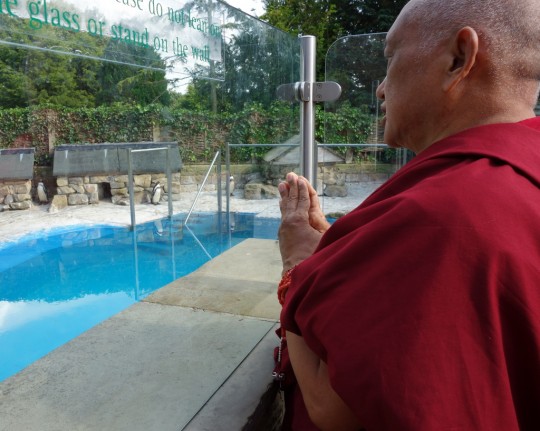
Lama Zopa Rinpoche blessing the penguins in the Bird Garden of Harewood House, Leeds, UK, July 2014. Photo by Ven. Roger Kunsang.
“It is extremely important that we make an effort to lead a spiritual life while, as human beings, we have the opportunity to pursue inner methods that bring peace of mind,” Lama Zopa Rinpoche instructed in the teaching “In Search of a Meaningful Life,” given at Tushita Mahayana Meditation Centre in 1979.
“It is common experience that happiness does not arise from external factors alone,” Rinpoche continued. “If we check carefully into our own daily lives, we will easily see that this is true. In addition to external factors, there are also inner factors that come into play to establish happiness within us.
“If external development were all it took to produce lasting peace within us, then those who were rich in material possessions would have more peace and happiness while those who were poor would have less. But life is not always like this. There are many happy people with few riches and many wealthy people who are very unhappy.
“In India, for example, there are many pandits, highly realized yogis and even simple Dharma practitioners who live humble lives but have great peace of mind. The more they have renounced the unsubdued mind, the greater is their peace; the more they have renounced self-cherishing, anger, ignorance, attachment and so forth, the greater is their happiness.
“Great masters such as the Indian pandit Naropa and the Tibetan yogi Jetsün Milarepa owned nothing yet had incredible peace of mind. They were able to renounce the unsubdued mind, the source of all problems, and thus transcended all suffering. By actualizing the path to enlightenment they achieved a superior happiness. Thus, even though they often had to go days without food – the great yogi Milarepa lived for years in a cave subsisting only on wild nettles – they rank among the happiest people on Earth. Because they abandoned the three poisonous minds of ignorance, attachment and anger, their peace and happiness was indeed great. The more they renounced the unsubdued mind, the greater was their peace. …”
Read the entire teaching “In Search of a Meaningful Life” on the Lama Yeshe Wisdom Archive.
More information, photos and updates about FPMT spiritual director Lama Zopa Rinpoche can be found on Rinpoche’s homepage. If you’d like to receive news of Lama Zopa Rinpoche via email, sign up to Lama Zopa Rinpoche News.
- Tagged: happiness, lama zopa rinpoche
- 0
17
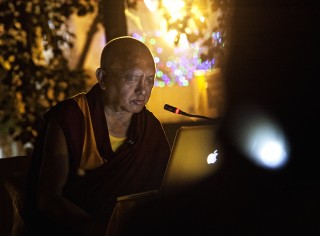
Lama Zopa Rinpoche reciting the Sutra of Golden Light at Mahabodhi Stupa, Bodhgaya, India, March 2014, Photo by Andy Melnic.
Chokhor Duchen, one of the four great holy days of the Tibetan calendar, is just around the corner. Also known as the Festival of Turning the Wheel of Dharma, Chokhor Duchen commemorates the anniversary upon which Shakyamuni Buddha first began teaching the Dharma. For seven weeks after his enlightenment, the Buddha did not teach. After this period, Indra and Brahma offered a dharmachakra and a conch shell and requested Shakyamuni to teach. Accepting, Buddha Shakyamuni turned the Wheel of Dharma for the first time at Sarnath by teaching on the Four Noble Truths.
Chokhor Duchen takes place this year on Thursday, July 31. As a Buddha Multiplying Day, karmic results of actions on this day are multiplied one hundred million times. This amazing result is sourced by Lama Zopa Rinpoche to the vinaya text Treasure of Quotations and Logic.
You can find Lama Zopa Rinpoche’s recommended practices for this special day here (on Rinpoche’s Advice page, under Buddha Multiplying Days), and a calendar of all the holy days here.
Chokhor Duchen also commemorates FPMT’s TWELFTH INTERNATIONAL SANGHA DAY
Here is how you can celebrate monastics on Sangha Day, July 31, 2014:
- Show respect for and appreciation of Sangha
- Generate deeper awareness of the Sangha jewel
- Donate to the Lama Yeshe Sangha Fund
Please keep in mind: According to Ven. Choden Rinpoche, one of Lama Zopa Rinpoche’s teachers, observation of auspicious days should be according to the date in India, not the date in one’s home country. Therefore, when Lama Zopa Rinpoche is not in India, Rinpoche celebrates Buddha Days and other auspicious dates according to the time in India.
Special thanks to the Liberation Prison Project for preparing the Tibetan Calendar.
If you choose to recite the Sutra of Golden Light on this special day, you might like to report your recitations using the facility on the FPMT website – which you can find on the Sutra of Golden Light reporting page. You can also find many other sutra texts available for free download on the FPMT Education Services’ Sutras page.
- Tagged: buddha day, fpmt education
17
“The four undesirable things [of the eight worldly dharmas] are suffering, not receiving material things, uninteresting words and a bad reputation,” Lama Zopa Rinpoche taught at the 14th Kopan Course in 1981. “We wish to avoid these four undesirable objects, for ourselves or for our friends and relatives. We wish for the opposite of these four undesirable things –happiness, receiving material things, sweet words, and a good reputation for ourselves, our friends and relatives. But what we wish for the enemy is the complete opposite – we wish that they receive the four undesirable things and do not receive the four desirable things. We seek the eight worldly dharmas for ourselves, our relatives and our friends.
“Practicing patience with the four undesirable things is like this. Whenever we meet suffering, we must practice patience. When somebody treats us badly and doesn’t give us material help, we must practice patience. When somebody insults us, we must practice patience. When somebody gives us a bad reputation, we must practice patience. When we meet these four undesirable things, we must practice patience. When the four undesirable things happen to our friends and relatives, we must also practice patience. When somebody harms our close friends and relatives and when they suffer, then we must also practice patience. When material help is not given to our friends and relatives, we must practice patience with that person who doesn’t help them. We must also practice patience with those who insult our friends and relatives, and give them a bad reputation.
“When our enemy is happy, or when somebody causes our enemy to receive perfections and to be happy, it is unbearable. It is unbearable that our enemy is happy. We dislike that our enemy is happy, comfortable and doesn’t have problems. However, when somebody makes our enemy happy, we must practice patience. Because we dislike that, again we must practice patience.
“When our enemy receives material offerings, again we must practice patience. If we don’t practice patience, we become jealous and when we see or hear that, we become very confused and unhappy. So, again, we must practice patience when we see that our enemy has received material things. …”
You can read the complete edited teaching “Practicing Patience with Our Enemy” on the Lama Yeshe Wisdom Archive.
More information, photos and updates about FPMT spiritual director Lama Zopa Rinpoche can be found on Rinpoche’s homepage. If you’d like to receive news of Lama Zopa Rinpoche via email, sign up to Lama Zopa Rinpoche News.
- Tagged: lama zopa rinpoche, patience
- 0
14
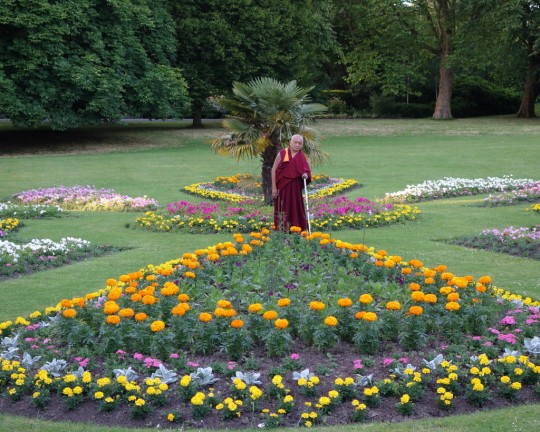
Lama Zopa Rinpche in a park in Leeds offering all the flowers to the “gurus and buddhas, statutes, stupas and scriptures, etc. etc.,” according to Ven. Roger Kunsang, UK, July 2014. Photo by Ven. Roger Kunsang.
“Offering one tiny flower to a statue or picture of Buddha receives immeasurable, limitless, merit,” Lama Zopa Rinpoche advised. “All the paths to happiness result from that. With just one grain of rice or one tiny flower, you can enter the path and achieve total enlightenment — the completion of all good qualities.
“After achieving enlightenment, you can liberate so many sentient beings from so much suffering and samsara and bring them to enlightenment. This is the result of offering one tiny flower. Each offering has all this benefit — like putting money in the bank. One dollar equals one billion trillion dollars in interest. This is an amazing benefit. It is important to remember this every day and offer as much as possible. If you see a beautiful flower, you visualize offering it to the guru and Buddha. The result and benefit is incredible. You can offer every single flower in a garden — the merit received is mind-blowing.
“This is how you use your precious human life, which is extremely rare and hard to find. Every time you see an object, use it to become closer to liberation and enlightenment. Many times each day, use your precious human rebirth to bring you closer and closer to liberation and enlightenment and thus to enlighten all sentient beings.”
Read more advice from Lama Zopa Rinpoche on making offerings, on the Lama Yeshe Wisdom Archive.
More information, photos and updates about FPMT spiritual director Lama Zopa Rinpoche can be found on Rinpoche’s homepage. If you’d like to receive news of Lama Zopa Rinpoche via email, sign up to Lama Zopa Rinpoche News.
- Tagged: lama zopa rinpoche, offerings
- 0
9
Newly Organized Webpages for FPMT Education Services
In accordance with the wishes, guidance, and advice of Lama Zopa Rinpoche, FPMT Education Services creates high quality study programs suitable for all levels which are available in FPMT centers, as homestudy materials, or via our Online Learning Center; publishes various practice materials in hard copy and digital formats; and works with a global network of educators, trainers, translators, and publishers to develop valuable training programs and translations.
FPMT Education has been called “the heart” of the FPMT organization.
Without understanding how your inner nature evolves, how can you possibly discover eternal happiness? Where is eternal happiness? It’s not in the sky or in the jungle; you won’t find it in the air or under the ground. Everlasting happiness is within you, within your psyche, your consciousness, your mind. That’s why it’s important that you investigate the nature of your own mind.
—Lama Yeshe
FPMT is unbelievably fortunate that we have many qualified teachers who are not only scholars but are living in practice. If you look, then you can understand how fortunate we are having the opportunity to study. With our Dharma knowledge and practice we can give the light of Dharma to others, in their heart. I think that’s the best service to sentient beings, the best service to the world.
—Lama Zopa Rinpoche
To help students access all that is available to them, we have been working to restructure the pages, links and downloads on the FPMT Education Services sections of fpmt.org. Please take a look at all that is available to you and let us know if you have further suggestions for our continued improvement of the FPMT Education pages. education@fpmt.org
- Tagged: fpmt education, fpmt education services
9
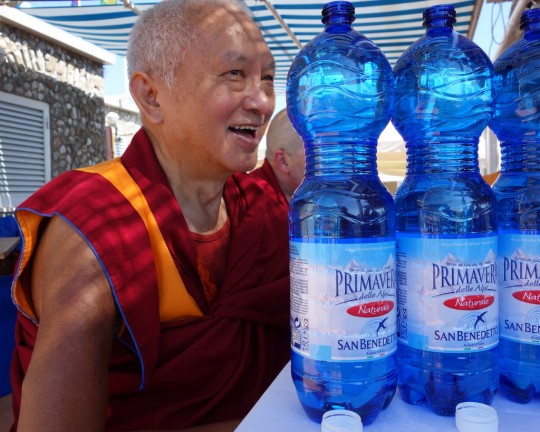
Lama Zopa Rinpoche blessing water to be offered to pretas at the beach, Italy, June 2014. Photo by Ven. Roger Kunsang.
“How can you make your life beneficial for your most kind, precious mother sentient beings, especially the pretas, and receive all happiness of the three times, including liberation from samsara and the great liberation – peerless, full enlightenment?” asks Lama Zopa Rinpoche in his advice on making offerings to the pretas.
“Pretas suffer heavily from hunger and thirst, not finding even a drop of water or a spoonful of food for hundreds of thousands of eons. They suffer from incredible exhaustion, disappointment, heat, and cold. In particular, pretas experience three types of obscuration: outer, inner, and food obscuration. The Yeshe Karda (Transcendental Wisdom Star-Arrow) practice enables every single preta to receive drink.
“If we go to the beach, how can we make our life most beneficial? If we do this practice when we go into the water, all the stones, lakes, and swimming pools are blessed. This is one way to make our life most beneficial for all sentient beings, here, in particular, for the pretas.
“Take some water from the ocean or swimming pool, put it in a container, visualize the deity Yeshe Karda above the water or container, and visualize nectar flowing from the deity into the water in the container. Then, recite the heart mantra of Yeshe Karda seven times:
“OM JNANA AVALOKITE SAMANTA PARANA RAMI BAWA SAMAYA MAHA MANI DURU DURU HRIH DAYA JALANI SOHA
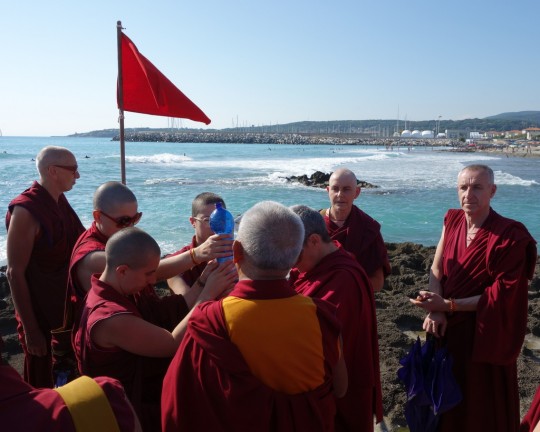
Lama Zopa Rinpoche with Sangha at the beach making offerings to pretas, Italy, June 2014. Photo by Ven. Roger Kunsang.
“Then, pour the water back into the ocean or swimming pool. Again, take water from the ocean or swimming pool, visualize the deity and the nectar flowing into the water, then again recite the mantra seven times. Hold the bottom of the container with your left hand, and the top of the container with your right hand. This should be done seven times, each time reciting the mantra seven times.
“Each time you pour out the water, visualize and say the following prayers:
“‘This ocean of water appears as nectar to all the pretas that the omniscient mind sees. All the pretas see it as an ocean of milk, they drink it and are fully satisfied. It liberates them from all sufferings, including the specific sufferings of the pretas, causes of delusion, karma, and defilements. These are all purified and they actualize the whole path to enlightenment.’
“Visualize every preta becoming Chenrezig.
“When you say this prayer, all the oceans appear as actual nectar to the pretas. The more detailed benefits of this practice are that all pretas will find devas’ food and drink. This is divine food in the form of nectar.
“Also, all the other beings, including animals and insects living in the water or who drink the water, are purified and achieve a higher rebirth. They will go onto the path of a happy transmigrating being. Therefore, the benefits of this practice are not limited to only the pretas. The benefits are vast.
“By receiving the blessing of this mantra, each preta receives as much food or drink as it needs, is fully satisfied, purified, and will be reborn in a higher realm. Whoever drinks this water has all their negative karma purified and will obtain a good rebirth in the higher realms.”
Read more advice from Rinpoche on offerings practices on “Lama Zopa Rinpoche’s Online Advice Book” on the Lama Yeshe Wisdom Archive.
More information, photos and updates about FPMT spiritual director Lama Zopa Rinpoche can be found on Rinpoche’s homepage. If you’d like to receive news of Lama Zopa Rinpoche via email, sign up to Lama Zopa Rinpoche News.
- Tagged: advice, lama zopa rinpoche
- 0
8
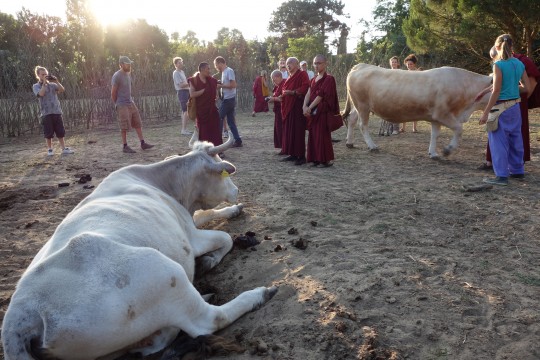
Lama Zopa Rinpoche blessing animals at the Fattoria della Pace Ippoasi, an animal sanctuary run by young vegans near Istituto Lama Tzong Khapa, Italy, June 2014. Photo by Ven. Roger Kunsang.
Lama Zopa Rinpoche has given much advice about benefiting and not harming animals. From “Lama Zopa Rinpoche’s Online Advice Book,” here’s Rinpoche’s advice on the karma of killing animals:
“Animals have feelings. They have the same mind as we have, and also want happiness, like we do. For example, if you suddenly touch them, they are immediately frightened. They get frightened if somebody beats or hits them with a stick. We also get frightened. If somebody throws cold water on our body, suddenly we feel a shock. It is the same for animals. They have the same mind, and it is very important what happens to them.
“Even if they can’t speak, can’t express themselves, animals can show their fear through their body. For example, they try to run away. Human beings can talk and complain, and they can bring court cases. Human beings can report things to the police. Human beings can do so much, but animals can’t – they can do nothing. They can’t express their suffering. Human beings can talk about their fears. Whether other people accept your suffering or not, at least you can explain it and the other person can hear. Animals can’t, but you can see how they feel from their movements. If someone tries to attacks them, they run away. They are afraid, which means they want happiness and not suffering. This is a very important point, that they have the same mind as us. If you kill them, you create the negative karma to be like them. For one hundred thousand lifetimes, you will have the karma to be born as an animal. For many thousands of lifetimes, you will suffer the consequences.
“It is said in the teachings that if you kill one animal, because of that karma, you will be killed five hundred times by others. You will suffer in the very hot hell realm for one thousand eons. It is also good to ask yourself how it would be if somebody killed you with a knife. How would you feel in that situation? For example, if you put your finger in hot water, can you bear that? You can’t bear it. It’s the same when you kill animals. There is no good result from it. There is no question about that.”
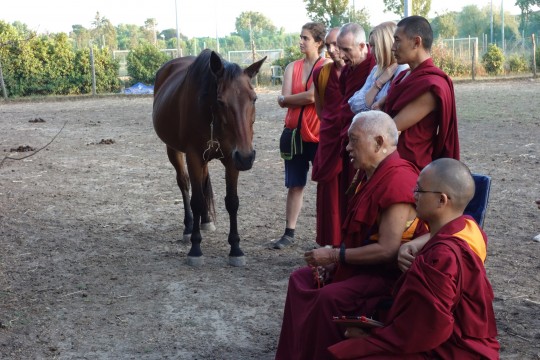
Lama Zopa Rinpoche spent three hours at the animal sanctuary, blessing the animals, which had been rescued from slaughter, and explained how to help the animals spiritually, Fattoria della Pace Ippoasi, Italy, June 2014. Photo by Ven. Roger Kunsang.
You can find “Lama Zopa Rinpoche’s Online Advice Book” on the Lama Yeshe Wisdom Archive website.
Learn more about FPMT spiritual director Lama Zopa Rinpoche and his beneficial activities by visiting Rinpoche’s homepage, where you will find links to Rinpoche’s schedule, new advice, recent video, photos and more.
- Tagged: advice, animals, lama zopa rinpoche
- 0
3
While staying at Root Institute in Bodhgaya, India, in February 2014, Lama Zopa Rinpoche translated an explanation of the eight auspicious signs, adding brief commentary. Rinpoche’s interest arose from a “conversation when Rinpoche was questioning whether it was OK to step over the eight auspicious signs or not,” shared Ven. Sarah Thresher, who served as scribe for Rinpoche’s dictation.
“Probably many of us do not know how important these eight auspicious signs are and how they affect our lives,” Rinpoche said. “They can be used externally to help with one’s own success as well as with the FPMT organization to be successful in benefiting others and working for the [dissemination of the] teachings of the Buddha. Putting these eight auspicious signs around everywhere, outside and also inside the rooms, makes things very auspicious. It is not necessary to put all eight together, and they don’t all need to be in the same place. They can be placed separately at different locations, but you should have all of them. …”
You can read the entire advice in the online edition of Mandala July-September 2014.
More information, photos and updates about FPMT spiritual director Lama Zopa Rinpoche can be found on Rinpoche’s homepage. If you’d like to receive news of Lama Zopa Rinpoche via email, sign up to Lama Zopa Rinpoche News.
- Tagged: advice, eight auspicious symbols, lama zopa rinpoche
- 0
1
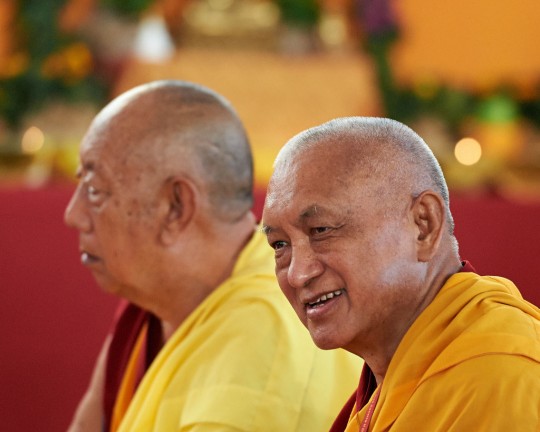
Sera Je Abbot Khenrinpoche Lobsang Delek and Lama Zopa Rinpoche at future site of Lhungtok Choekhorling, Pomaia, Italy, June 13. Photo by Olivier Adam.
Every month new advice is added to “Lama Zopa Rinpoche’s Online Advice Book” on the Lama Yeshe Wisdom Archive, which also has a list of recently added advice. Here’s an excerpt from a letter from Rinpoche on doing daily practice:
“Regarding the existing practices you are doing, one big thing that is missing is reciting OM MANI PADME HUM – especially doing this with bodhichitta for numberless hell beings, numberless hungry ghosts, numberless human beings, numberless suras, numberless asuras and numberless intermediate state beings; for everyone to be free from the oceans of samsaric suffering as quickly as possible and to achieve full enlightenment, peerless happiness, omniscient mind.
“Recite every single OM MANI PADME HUM for every single sentient being, doing one mala or more, your choice. Every mantra you recite is for every sentient being and for yourself to achieve enlightenment, which means to actualize the path, lam-rim, to purify all the defilements and negative karma collected since beginningless time and to collect extensive merits, the cause of dharmakaya and rupakaya. It is especially to develop compassion for all sentient beings forever, to everyone, so no one is left out; no ant is left out, not one mosquito is left out, not one sentient being is left out; to develop compassion and through compassion to achieve enlightenment for sentient beings. This is so important. You don’t want to recite the mantra for your own happiness; you need to recite it for sentient beings’ temporary and ultimate happiness. …”
You can read the complete advice on the website of the Lama Yeshe Wisdom Archive.
More information, photos and updates about FPMT spiritual director Lama Zopa Rinpoche can be found on Rinpoche’s homepage. If you’d like to receive news of Lama Zopa Rinpoche via email, sign up to Lama Zopa Rinpoche News.
- Tagged: advice, daily practice, lama zopa rinpoche
- 0
26
Om Mani Padme Hum Cap for Summer!
It is officially summer in North America and everyone could use a little shade from the sun.
This charming OM MANI PADME HUM hat was designed by Lama Zopa Rinpoche and is covered with beautifully embroidered mantras.
Just by wearing this hat when you go out in public, not only when you play golf but anywhere, in the street, on the beach, in the market, where many people are shopping – anywhere that animals or people can see you – you are liberating others. If any flies or other insects go under or around your hat (with mantras on), or maybe a person walks around you on the way to another shop, all the time you are liberating so many sentient beings who are suffering. – Lama Zopa Rinpoche
26
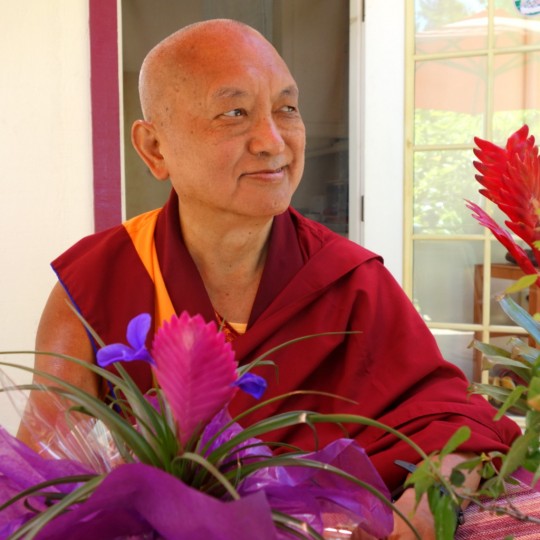
Lama Zopa Rinpoche at Kachoe Dechen Ling, Aptos, California, June 2014. Photo by Ven. Roger Kunsang.
Advice from Lama Zopa Rinpoche, recently shared on fpmt.org:
“If it was possible, I should offer you each trillions of dollars for learning about Buddhism. This means your mind is open for real happiness, to be free from the gross suffering in the three lower realms and even not to be satisfied with the temporary happiness of the three upper realms. Most importantly, once you can meet and practice Dharma, this frees you from samsaric happiness, which is only suffering; and Dharma can give you full enlightenment, peerless happiness. Learning Dharma and practicing it is so important for yourself as well as others, countless others, as once you can achieve enlightenment, you can free countless living beings – all living beings – from the oceans of suffering. So you can see there is nothing more important than this: to learn Dharma and practice. …”
You can read the full advice and find more advice on the “Advice from Lama Zopa Rinpoche” page.
More information, photos and updates about FPMT spiritual director Lama Zopa Rinpoche can be found on Rinpoche’s homepage. If you’d like to receive news of Lama Zopa Rinpoche via email, sign up to Lama Zopa Rinpoche News.
- Tagged: advice, lama zopa rinpoche
- 0
24
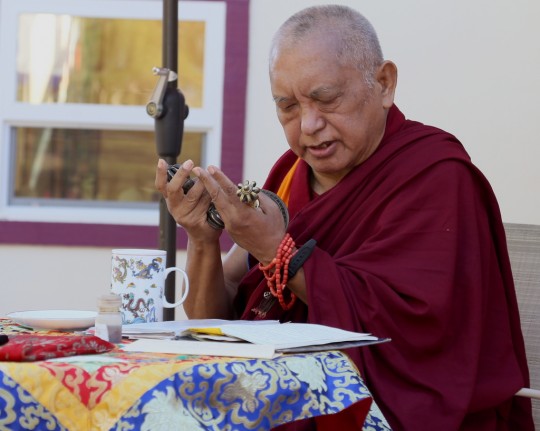
Lama Zopa Rinpoche doing an incense puja at Kachoe Dechen Ling, Aptos, California, US, May 2014. Photo by Ven. Thubten Kunsang.
In a recent post on the Lama Yeshe Wisdom Archive, you can read Lama Zopa Rinpoche’s advice on how to transform depression into the path of enlightenment:
“Depression can be a good thing, because it is a sign of purification, of having practiced Dharma.
“There are different levels of how negative karma is purified. With the first level, you never experience the suffering results of your actions. With the second level, you experience these results, but rather than experiencing the suffering result of the negative action for many eons in the lower realms – the hell, hungry ghost or animal realms – instead, the result manifests in this life in the form of some problem, such as depression, a toothache or headache, or being criticized by people and so forth. Unbelievably negative karma manifests as just this problem or even as bad dreams or nightmares; often in the form of sickness, failure in business, or some disaster in your family or in your relationships – other people treating you badly or abusing you; and also in the form of depression.
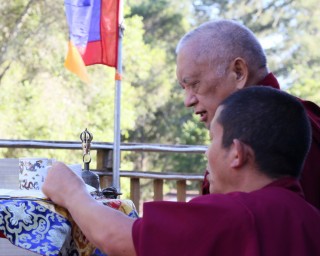
Lama Zopa Rinpoche doing incense puja at Kachoe Dechen Ling, Aptos, California, US, May 2014. Photo by Ven. Thubten Kunsang.
“This way you never have to experience the heavy suffering for an incredible length of time, therefore, experiencing this depression is a positive thing. This can be related to whatever problems you have, so you feel positive and happy about them. You should understand all the rest of your problems, whatever you have, in this same way.
“Then there’s the next level of purifying karma. By experiencing this [suffering result] now, you don’t have to be reborn in the lower realms, or maybe for a very short time and the suffering is very light. For example, when you throw a stone on a rock, it hits in one second, like snapping your fingers. Similarly, in that way, all those heavy sufferings for a great length of time are finished instead, by experiencing this suffering now. If you compare that to the experience of heavy suffering for an incredible length of time, it’s very positive, very good. It’s fantastic!
“There’s no question that the problems experienced in the human realm are an incredibly great comfort, even a pleasure, compared to those extremely heavy sufferings in the hell, hungry ghost and animal realms. So now that negative karma that we don’t have to experience is really fantastic. …”
You can read the complete post “Advice on Transforming Depression,” part of “Lama Zopa Rinpoche’s Online Advice Book,” on the Lama Yeshe Wisdom Archive.
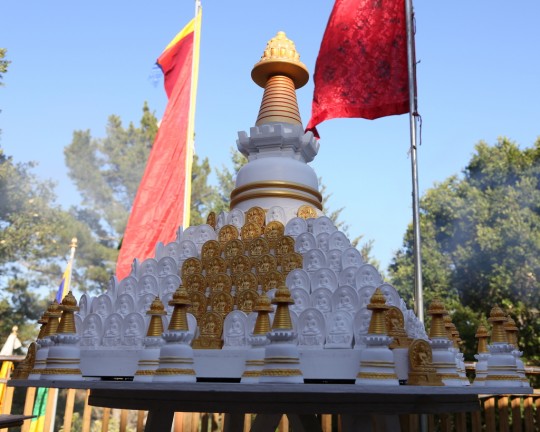
A stupa surrounded by tsa-tsas at Kachoe Dechen Ling, Aptos, California, May 2014. Photo by Ven. Thubten Kunsang.
Lama Zopa Rinpoche is the spiritual director of the Foundation for the Preservation of Mahayana Tradition (FPMT), an organization dedicated to preserving Mahayana Buddhism through offering the Buddha’s authentic teachings and to facilitating reflection, meditation, practice and the opportunity to actualize and directly experience the Buddha’s teachings. Sign up to receive news and updates.
- Tagged: depression, lama zopa rinpoche, purification
- 1
- Home
- News/Media
- Study & Practice
- About FPMT Education Services
- Latest News
- Programs
- New to Buddhism?
- Buddhist Mind Science: Activating Your Potential
- Heart Advice for Death and Dying
- Discovering Buddhism
- Living in the Path
- Exploring Buddhism
- FPMT Basic Program
- FPMT Masters Program
- FPMT In-Depth Meditation Training
- Maitripa College
- Lotsawa Rinchen Zangpo Translator Program
- Universal Education for Compassion & Wisdom
- Online Learning Center
- Prayers & Practice Materials
- Overview of Prayers & Practices
- Full Catalogue of Prayers & Practice Materials
- Explore Popular Topics
- Benefiting Animals
- Chenrezig Resources
- Death & Dying Resources
- Lama Chopa (Guru Puja)
- Lama Zopa Rinpoche: Compendium of Precious Instructions
- Lama Zopa Rinpoche: Life Practice Advice
- Lama Zopa Rinpoche Practice Series
- Lamrim Resources
- Mantras
- Prayer Book Updates
- Purification Practices
- Sutras
- Thought Transformation (Lojong)
- Audio Materials
- Dharma Dates – Tibetan Calendar
- Translation Services
- Publishing Services
- Teachings and Advice
- Find Teachings and Advice
- Lama Zopa Rinpoche Advice Page
- Lama Zopa Rinpoche: Compendium of Precious Instructions
- Lama Zopa Rinpoche Video Teachings
- ༧སྐྱབས་རྗེ་བཟོད་པ་རིན་པོ་ཆེ་མཆོག་ནས་སྩལ་བའི་བཀའ་སློབ་བརྙན་འཕྲིན།
- Podcasts
- Lama Yeshe Wisdom Archive
- Buddhism FAQ
- Dharma for Young People
- Resources on Holy Objects
- Ways to Offer Support
- Centers
- Affiliates Area
- Teachers
- Projects
- Charitable Projects
- Make a Donation
- Applying for Grants
- News about Projects
- Other Projects within FPMT
- Support International Office
- Projects Photo Galleries
- Give Where Most Needed
- FPMT
- Shop
Subscribe to FPMT News
Translate*
*powered by Google TranslateTranslation of pages on fpmt.org is performed by Google Translate, a third party service which FPMT has no control over. The service provides automated computer translations that are only an approximation of the websites' original content. The translations should not be considered exact and only used as a rough guide.You are responsible for your own problems just as you’re responsible for your own liberation and enlightenment.







